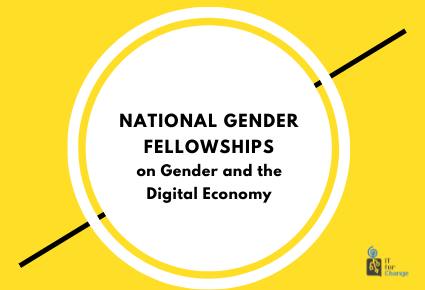As part of our ongoing projects on gender and the digital economy, IT for Change invited proposals and pitches under two National Gender Fellowship tracks.
1. Research Fellowship, under the European Commission supported project, Centering Women in India’s Digitalizing Economy.
2. Fellowship for Longform Essay, as part of The Feminist Observatory of the Internet, our collaboration with the World Wide Web Foundation.
Through Fellowships targeted at early-career researchers and writers, we see an opportunity for field-building in a nascent, but cutting-edge, area of scholarship. We seek to contribute rigorous research and analysis on key questions that concern the future of women’s work in India, catalyzing a body of knowledge that engages with existing scholarship, while exploring new horizons in the domain of digitalization. The objective is not only to build critique but also to propose ways forward.
You can read the synopses of our Track 1 research fellowships here.
You can read the complete compendium of long-form essays here.
Meet Our Fellows
Our diverse and interdisciplinary network of 20 fellows are, through research on a broad array of topics, working towards the shared goal of building a feminist future of work in India's digital economy.
Track 1: Research Fellowships
|
Aparna Asokan |
|
Aparna's research paper focuses on the impact of remote working on women employees in the IT-ITES sector and attempts to identify the decent work deficit in remote working. |
|
Aishwarya Shridhar |
|
Aishwarya's study aims to understand the impact of digitalization on the sex work industry by exploring how Indian women utilize adult webcam platforms as a source of income. |
|
Swati Rao |
|
Swati's research proposes to understand various barriers for women workers engaging in gig work, whether gig platforms are equipped to address these, and the government's regulatory response, resulting in a “Regulatory Roadmap for Gig Work” which will provide recommendations on policy interventions along four dimensions: Safety and security, data protection and privacy, wage security and dispute redressal. |
|
Rhea D'Silva |
|
Rhea's project is interested in exploring the processes that take place between diverse hiring and inclusion for women designers who are a part of a team designing tech products. |
|
Sruthi Kalyani A |
|
Sruthi's project intends to study the extent of female participation and alternate forms of value creation in Indian makerspaces. It attempts to bring in the discourse of generative justice and personal agency in these emerging innovation spaces. |
|
Ann Mary Biju |
|
Through this project, Ann will compare various online and offline women service providers of the platform economy in terms of the nature of threats they face, worker safety, redressal mechanisms available and awareness among employees of the same, support systems desired from platforms to facilitate safe working environments for women and their future aspirations in life. |
|
Sapni G K |
|
Sapni's research will analyze the politico-legal concerns for platform cooperatives while couching them on socio-economic realities to enquire whether platform cooperatives can be a viable feminist alternative to corporate platforms in India. It will propose possible policy solutions and positive regulation that can position platform cooperatives as a viable alternative in India. |
|
Abhiruchi Chatterjee |
|
Abhiruchi's research examines the digital empowerment of women-led small businesses through government schemes and interventions - the impact on women entrepreneurs' individual empowerment and sustainability and outreach of the business. |
|
Aanchal Dhull |
|
Aanchal's study aims to understand the gradation of skill in the context of digital platforms and whether digitalization of domestic work can transcend social profiling or does it further reinforce the laboring patterns along caste, class, and religious identities of domestic workers. |
|
Arya Chandran L |
|
Arya's study aims to understand the Opportunities and Challenges of market digitalization for coastal women fish vendors. |
Track 2: Long Form Essays
|
Malavika Parthasarathy |
|
Agency in Influencer Culture: How Skincare, Beauty and Fashion Influencers Engage with Platform Capitalism |
|
Debarun Sarkar |
|
Of Sex Work, Payment and the Future of Work |
|
Nadia Nooreyezdan |
|
On Being Watched: How Surveillance Impacts Women’s Work |
|
Mitali Nikore |
|
Women Entrepreneurs and the Digital Economy: Analyzing Exclusion from Digital |
|
Eisha Choudhary |
|
Muslim Women Engaged in Entrepreneurship: Negotiating the Intersectionalities of Identity, Religion and Work in a Digital Space |
|
Svetha Venkatram |
|
How are women using incubators and technology to scale their start-ups? |
|
Intifada P. Basheer |
|
A Look Into AI’s Gender Problem In Indian Call Centre Industry |
|
Vijayeta Rajkumari |
|
Gender and Digital Divide: Handloom Weavers in North-East India. |
|
Abir Dasgupta |
|
Understanding Covid-19 vaccine hesitancy and anti-vaxx in India |
|
Maduli Thaosen |
|
Locating Northeast India's Tribal Women and LGBTQIA+ in India's Feminist Digital Media Economy |

